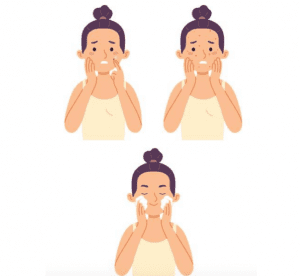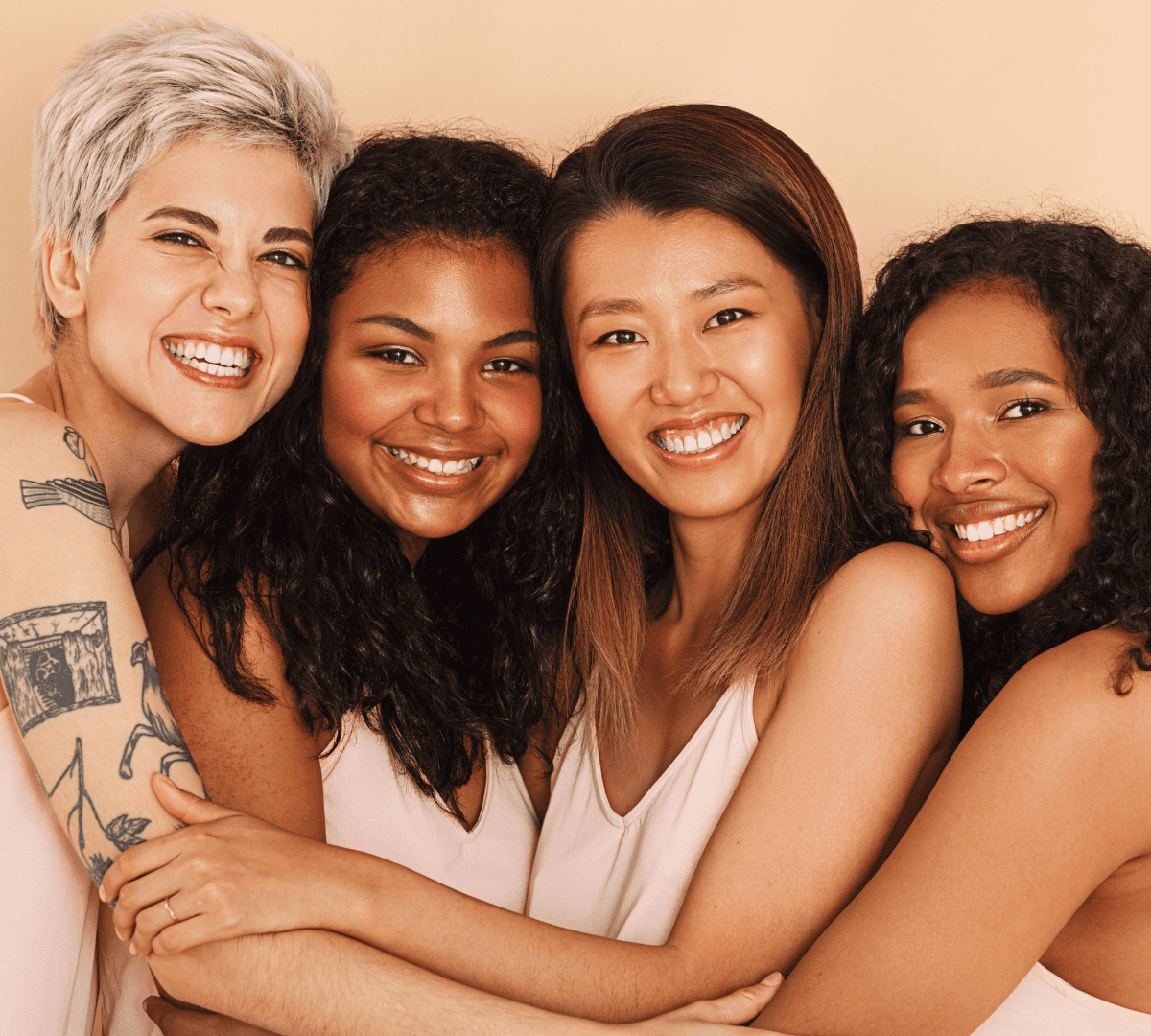Medically reviewed by Sophia Yen, MD, MPH – Written by Pandia Health Editorial Team. Updated on April 30, 2021
How Does Birth Control Treat and Prevent Acne Breakouts?

Millions of people suffer from painful and embarrassing acne breakouts. Unfortunately, they can happen at any time during a person’s life, not just during their teenage years. For women especially, acne can be incredibly hard to treat, as it is often related to hormonal fluctuations associated with the menstrual cycle and perimenopause.
Unlike teenage acne, hormonal adult acne is stubborn and if left untreated, can lead to physical discomfort and emotional distress. One way that individuals with a uterus can safely and effectively treat stubborn breakouts is by implementing hormonal birth control. For teenagers and adult women alike, taking the birth control pill can lead to health benefits such as clearer skin, decreased stress, and improved self-esteem. The following content will delve into the relationship between birth control and acne treatment.
What causes acne?
In many cases, bacteria, excess sebum, and inflammation are to blame for flare-ups. With that said, there is not one known cause of acne, but rather an abundance of factors that could apply in an individual’s life.
- Hormone fluctuations = change in hormone levels due to life cycle changes (i.e. menstruation and/or menopause) may be followed by increased acne
- Diet = certain foods groups (i.e. processed sugar and dairy) may lead to flare ups, though this is not the case for all individuals
- Some medications = medication used to treat certain physical and mental illnesses could cause breakouts, though this may vary and be temporary
- Makeup that clogs pores = some chemicals in face makeup are more harsh on the skin, thus, leading to more frequent breakouts
- Frequently touching or rubbing the skin = while this alone may not cause acne, it is not recommended, as you can transfer bacteria to the skin
- Having a family history of adult acne = acne may be more genetic than environmental (a.k.a if your mother struggles with acne, your risk becomes greater)
What are signs of hormonal acne?
Hormonal acne differs from other types of acne in that it is specifically related to hormones. While this is not always easy to distinguish, if you notice one or more of the following, the acne you are experiencing may be related to hormones.
- Breakouts that recur around the same time in the same areas of the skin every month.
- Painful, deep cysts (not whiteheads or blackheads)
- Individual pimples around the chin, jawline, neck, or sides of the face.
Why is acne more common in adult women?
Hormones are a huge culprit in adult women. More specifically, women who have sensitive androgen receptors (a.k.a male sex hormones that regulate the skin’s oil production) are at risk of experiencing acne well into adulthood. As women enter perimenopause, their estrogen levels decrease, causing their skin to be more prone to breakouts.
How can birth control prevent acne?
Acne is a direct result of an imbalance of hormones produced by the ovaries: estrogen (the female hormone) and progesterone (the hormone needed to make testosterone). Sometimes, when the ovaries produce estrogen, it gets turned into progesterone – it is the excess of this hormone that can lead to acne. Fortunately, birth control pills turn this function off, preventing the excess of male hormones in your system. More specifically, being on the pill creates a protein that binds to the extra male hormones, resulting in less production of them.
Want to find the best birth control for acne?
Sign up for Pandia Health and our expert birth control doctors will find the best acne treatment for you.
- Starting at $7 per pack or FREE with insurance (cancel anytime)*
- FREE delivery and FREE goodies
- Expert care by expert birth control doctors
- With or without a prescription, we can help you!
*Pricing may vary based on medication
Birth control used to treat mild to severe acne
Currently, the FDA has approved only three birth control pills to treat acne: Ortho Tri Cyclen (discontinued), Estrostep, and Yaz. However, research has shown that ANY birth control pill can improve acne. Furthermore, you do NOT have to use the three that spent the money to get tested and approved for acne.
Ortho Tri Cyclen & Estrostep for acne
Ortho Tri Cyclen contains estrogen combined with a progestin, or synthetic progesterone, called norgestimate. Estrostep uses estrogen combined with a progestin called norethindrone.
Beyaz & Yaz for acne
Beyaz and Yaz contain drospirenone, a progesterone with a potential diuretic effect. Women with a history of blood clots or who have risk factors for blood clots should not take any birth control with drospirenone.
How long does it take for birth control to help acne?
It can take as short as 4-6 weeks or as long as a few months after starting birth control pills to see a significant decrease in acne. It is common for women to experience an initial flare-up of acne after starting birth control, but this should eventually go away. The process takes a while because the body may need a few months to get used to the new hormones being introduced.
With all of that being said, women who have more severe acne will need to use topical medications like tretinoin cream or other acne treatment products (like topical or oral antibiotics) to get the best results.
Is severe acne a sign of polycystic ovary syndrome (PCOS)?
Polycystic ovary syndrome (PCOS) is a hormonal disorder that causes cysts to develop in the ovaries. Sometimes, PCOS prevents women from ovulating every month, resulting in irregular and/or painful periods. Severe hormonal acne can be a sign of PCOS, but not always. Symptoms normally show up around an individual’s first menstrual cycle during puberty. Irregular periods (infrequent, irregular, or prolonged) excess facial and body hair, and trouble losing weight are some of the most common symptoms for PCOS. Going on birth control pills can help balance the hormones and, thus, decrease the severity of symptoms.
Can birth control make acne worse?
While many women report an improvement with their acne when going on the pill, there have been cases where acne has gotten worse due to birth control. Fortunately, this is highly unlikely to happen with most types of birth control.
What birth control makes acne worse?
Birth control pills that only contain progesterone hormones, otherwise known as the mini pill, will make acne worse. Women who suffer from acne breakouts should steer clear of these contraceptives.
Women can find relief from painful, annoying breakouts by taking birth control pills. With several types to choose from, it’s possible for any woman to find a pill that will work for her lifestyle. If you’re concerned about acne flare-ups, talk to your doctor about getting started with safe, effective birth control for hormonal skin problems.
How can Pandia Health help?
With Pandia Health, anyone is bound to find the type of birth control that works for them. We offer the pill (99% effective), the patch (99% effective), and the ring (99% effective). Sign up today and get hassle-free, EXPERT care from doctors who will help you find the birth control will serve you best.
Disclaimer: The views expressed in this article intend to inform and induce conversation. They are the views of the author and do not necessarily represent the views of Pandia Health, and are for informational purposes only, even if and to the extent that this article features the advice of physicians and medical practitioners. This article is not, nor is it intended to be, a substitute for professional medical advice, diagnosis or treatment, and should never be relied upon for specific medical advice.

